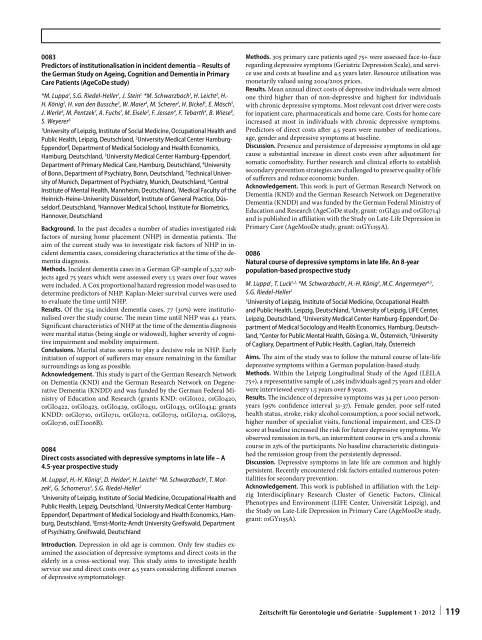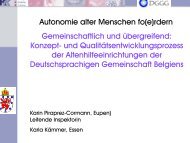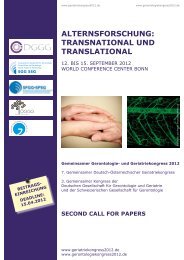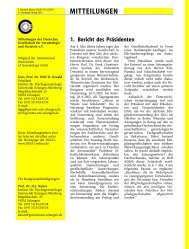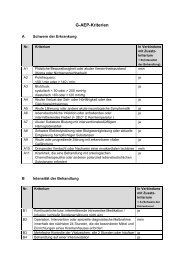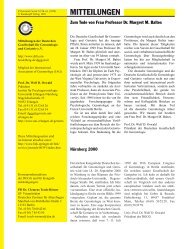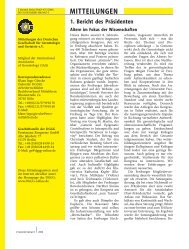Alternsforschung: Transnational und translational Gemeinsamer ...
Alternsforschung: Transnational und translational Gemeinsamer ...
Alternsforschung: Transnational und translational Gemeinsamer ...
Erfolgreiche ePaper selbst erstellen
Machen Sie aus Ihren PDF Publikationen ein blätterbares Flipbook mit unserer einzigartigen Google optimierten e-Paper Software.
0083<br />
Predictors of institutionalisation in incident dementia – Results of<br />
the German Study on Ageing, Cognition and Dementia in Primary<br />
Care Patients (AgeCoDe study)<br />
*M. Luppa 1 , S.G. Riedel-Heller 1 , J. Stein 1, *M. Schwarzbach 1 , H. Leicht 2 , H.-<br />
H. König 2 , H. van den Bussche 3 , W. Maier 4 , M. Scherer 3 , H. Bickel 5 , E. Mösch 5 ,<br />
J. Werle 6 , M. Pentzek 7 , A. Fuchs 7 , M. Eisele 3 , F. Jessen 4 , F. Tebarth 4 , B. Wiese 8 ,<br />
S. Weyerer 6<br />
1 University of Leipzig, Institute of Social Medicine, Occupational Health and<br />
Public Health, Leipzig, Deutschland, 2 University Medical Center Hamburg-<br />
Eppendorf, Department of Medical Sociology and Health Economics,<br />
Hamburg, Deutschland, 3 University Medical Center Hamburg-Eppendorf,<br />
Department of Primary Medical Care, Hamburg, Deutschland, 4 University<br />
of Bonn, Department of Psychiatry, Bonn, Deutschland, 5 Technical University<br />
of Munich, Department of Psychiatry, Munich, Deutschland, 6 Central<br />
Institute of Mental Health, Mannheim, Deutschland, 7 Medical Faculty of the<br />
Heinrich-Heine-University Düsseldorf, Institute of General Practice, Düsseldorf,<br />
Deutschland, 8 Hannover Medical School, Institute for Biometrics,<br />
Hannover, Deutschland<br />
Backgro<strong>und</strong>. In the past decades a number of studies investigated risk<br />
factors of nursing home placement (NHP) in dementia patients. The<br />
aim of the current study was to investigate risk factors of NHP in incident<br />
dementia cases, considering characteristics at the time of the dementia<br />
diagnosis.<br />
Methods. Incident dementia cases in a German GP-sample of 3,327 subjects<br />
aged 75 years which were assessed every 1.5 years over four waves<br />
were included. A Cox proportional hazard regression model was used to<br />
determine predictors of NHP. Kaplan-Meier survival curves were used<br />
to evaluate the time until NHP.<br />
Results. Of the 254 incident dementia cases, 77 (30%) were institutionalised<br />
over the study course. The mean time until NHP was 4.1 years.<br />
Significant characteristics of NHP at the time of the dementia diagnosis<br />
were marital status (being single or widowed), higher severity of cognitive<br />
impairment and mobility impairment.<br />
Conclusions. Marital status seems to play a decisive role in NHP. Early<br />
initiation of support of sufferers may ensure remaining in the familiar<br />
surro<strong>und</strong>ings as long as possible.<br />
Acknowledgement. This study is part of the German Research Network<br />
on Dementia (KND) and the German Research Network on Degenerative<br />
Dementia (KNDD) and was f<strong>und</strong>ed by the German Federal Ministry<br />
of Education and Research (grants KND: 01GI0102, 01GI0420,<br />
01GI0422, 01GI0423, 01GI0429, 01GI0431, 01GI0433, 01GI0434; grants<br />
KNDD: 01GI0710, 01GI0711, 01GI0712, 01GI0713, 01GI0714, 01GI0715,<br />
01GI0716, 01ET1006B).<br />
0084<br />
Direct costs associated with depressive symptoms in late life – A<br />
4.5-year prospective study<br />
M. Luppa 1 , H.-H. König 2 , D. Heider 2 , H. Leicht 2, *M. Schwarzbach 1 , T. Motzek<br />
1 , G. Schomerus 3 , S.G. Riedel-Heller 1<br />
1 University of Leipzig, Institute of Social Medicine, Occupational Health and<br />
Public Health, Leipzig, Deutschland, 2 University Medical Center Hamburg-<br />
Eppendorf, Department of Medical Sociology and Health Economics, Hamburg,<br />
Deutschland, 3 Ernst-Moritz-Arndt University Greifswald, Department<br />
of Psychiatry, Greifswald, Deutschland<br />
Introduction. Depression in old age is common. Only few studies examined<br />
the association of depressive symptoms and direct costs in the<br />
elderly in a cross-sectional way. This study aims to investigate health<br />
service use and direct costs over 4.5 years considering different courses<br />
of depressive symptomatology.<br />
Methods. 305 primary care patients aged 75+ were assessed face-to-face<br />
regarding depressive symptoms (Geriatric Depression Scale), and service<br />
use and costs at baseline and 4.5 years later. Resource utilisation was<br />
monetarily valued using 2004/2005 prices.<br />
Results. Mean annual direct costs of depressive individuals were almost<br />
one third higher than of non-depressive and highest for individuals<br />
with chronic depressive symptoms. Most relevant cost driver were costs<br />
for inpatient care, pharmaceuticals and home care. Costs for home care<br />
increased at most in individuals with chronic depressive symptoms.<br />
Predictors of direct costs after 4.5 years were number of medications,<br />
age, gender and depressive symptoms at baseline.<br />
Discussion. Presence and persistence of depressive symptoms in old age<br />
cause a substantial increase in direct costs even after adjustment for<br />
somatic comorbidity. Further research and clinical efforts to establish<br />
secondary prevention strategies are challenged to preserve quality of life<br />
of sufferers and reduce economic burden.<br />
Acknowledgement. This work is part of German Research Network on<br />
Dementia (KND) and the German Research Network on Degenerative<br />
Dementia (KNDD) and was f<strong>und</strong>ed by the German Federal Ministry of<br />
Education and Research (AgeCoDe study, grant: 01GI431 and 01GI0714)<br />
and is published in affiliation with the Study on Late-Life Depression in<br />
Primary Care (AgeMooDe study, grant: 01GY1155A).<br />
0086<br />
Natural course of depressive symptoms in late life. An 8-year<br />
population-based prospective study<br />
M. Luppa 1 , T. Luck 1,2, *M. Schwarzbach 1 , H.-H. König 3 , M.C. Angermeyer 4,5 ,<br />
S.G. Riedel-Heller 1<br />
1 University of Leipzig, Institute of Social Medicine, Occupational Health<br />
and Public Health, Leipzig, Deutschland, 2 University of Leipzig, LIFE Center,<br />
Leipzig, Deutschland, 3 University Medical Center Hamburg-Eppendorf, Department<br />
of Medical Sociology and Health Economics, Hamburg, Deutschland,<br />
4 Center for Public Mental Health, Gösing a. W., Österreich, 5 University<br />
of Cagliary, Department of Public Health, Cagliari, Italy, Österreich<br />
Aims. The aim of the study was to follow the natural course of late-life<br />
depressive symptoms within a German population-based study.<br />
Methods. Within the Leipzig Longitudinal Study of the Aged (LEILA<br />
75+), a representative sample of 1,265 individuals aged 75 years and older<br />
were interviewed every 1.5 years over 8 years.<br />
Results. The incidence of depressive symptoms was 34 per 1,000 personyears<br />
(95% confidence interval 31-37). Female gender, poor self-rated<br />
health status, stroke, risky alcohol consumption, a poor social network,<br />
higher number of specialist visits, functional impairment, and CES-D<br />
score at baseline increased the risk for future depressive symptoms. We<br />
observed remission in 60%, an intermittent course in 17% and a chronic<br />
course in 23% of the participants. No baseline characteristic distinguished<br />
the remission group from the persistently depressed.<br />
Discussion. Depressive symptoms in late life are common and highly<br />
persistent. Recently encountered risk factors entailed numerous potentialities<br />
for secondary prevention.<br />
Acknowledgement. This work is published in affiliation with the Leipzig<br />
Interdisciplinary Research Cluster of Genetic Factors, Clinical<br />
Phenotypes and Environment (LIFE Center, Universität Leipzig), and<br />
the Study on Late-Life Depression in Primary Care (AgeMooDe study,<br />
grant: 01GY1155A).<br />
Zeitschrift für Gerontologie <strong>und</strong> Geriatrie · Supplement 1 · 2012 |<br />
119


